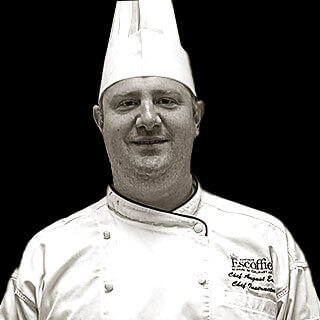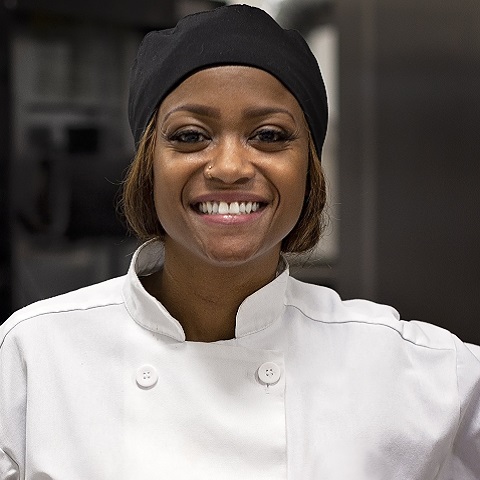While there’s no linear ladder to climb in the culinary world, becoming an “executive chef” can truly be considered one of the most rewarding roles.
Along with delivering cutting-edge dishes, this is ultimately a management position that usually requires proven leadership skills, plenty of experience, and a prolific vision. If you find yourself in the hot seat for an executive chef interview, here’s how you might begin to prepare!
Executive Chef Interview Tips
Before we dive into some common chef interview questions, let’s explore some helpful tips to consider.

Culinarian preparing for a chef interview.
1. Do Your Research
Like most job interviews, you’ll want to “do your homework” on the restaurant you’re interviewing for ahead of time. After all, knowledge is power!
What does this entail? Start with visiting the website and social media platforms, then hunt down any recent press releases that might reveal insight into any news pertaining to that restaurant. Also, make sure you glance over the current menu to get a feel for the cuisine style and conceptualize and prepare a few dishes that would fit nicely into the theme. The main goal is to gain a strong sense of the restaurant’s branding and ethos, so you can confidently communicate how you might bolster that vision.
It is a good idea to find out if the values of the company match the chef applicant. Being an executive chef means you will likely work closely with the business leadership and it is best to have professional goals that align.
“Whenever I prepare for an Executive Chef interview I like to find out as much as I can about that business beforehand. If you can learn the company values and goals it puts you in a great position to respond as an immediate asset. You can highlight solutions you possess and experiences you have that show you have the skills that need.”*
August Ench, Escoffier Chef and Culinary Instructor
2. Memorize Your Resume
The hiring manager will likely ask specific questions directly based on your resume. Review the jobs you have listed, reflect back on your experiences, and think through the fine details of your responsibilities. Knowing this information inside and out will likely help you during problem-solving and scenario-based interview questions.
3. Write Down Strengths That Align With the Job Description
Usually job descriptions can seem pretty lengthy and you might feel inclined to skim over the mountain of bullet points. However, you can use these details to tailor your strengths during the interview and verbally plug in “keywords” the hiring manager might be looking for. Before the interview, create a comprehensive list of both your strengths and weaknesses so you can fire away without hesitation.
Take some time in the interview to find out how this job opening occurred and what the business needs are. It may give you insight and allow you to present yourself as a solution. Also, finding out more about the business needs from the beginning will establish an instant connection with the hiring manager.
Many businesses may require seeing your practical cooking skills in action. Chefs may be asked to create a dish of their own or a dish from the current menu. If it is a menu dish, accuracy will be the main goal. However, if it is the chef’s own creation, it should reflect the style of the current cuisine while still being intriguing and delicious.
4. Dress to Impress
If you want to become an executive chef, make a great first impression and look the part. For a “working” interview that requires a tasting or stage, wear your neatly-pressed uniform and bring your own sharpened knife kit. If there’s no stage component to the interview, dress professionally and consider wearing a suit. This might help the hiring manager “see you” fulfilling this role.
5. Follow Chef Interview Etiquette
Some interview etiquette might seem common sense, but following these guidelines will likely communicate respect toward the hiring manager.
Chef Interview Etiquette Tips:
- When a hiring manager steps into the room, stand up and shake their hand.
- Do your best to listen when they speak and try to avoid interrupting.
- If you go on a kitchen tour, don’t walk ahead of or behind the hiring manager, but alongside them, if space allows.
- Try your best to use long-form, professional kitchen vocabulary versus slang.
- Don’t be late for an interview! Try to arrive at least 15 minutes early.
6. Prepare Follow-Up Questions
Remember that hiring managers are looking to onboard passionate chefs who are genuinely interested in the everyday operations of the restaurant. The best way to end an interview is to come prepared with succinct follow-up questions.
Example Follow-Up Questions
- What are some of the major challenges the restaurant faces currently, and how could I help improve them?
- I’d love to know more about the current team. Can you fill me in on their skills, strengths, and weaknesses? What type of leadership style are they more comfortable with?
- What does your decision-making process and timeline look like?
Executive Chef Role Expectations
Ultimately, an executive chef mandates most of the daily kitchen operations and might have a wide range of responsibilities. Although several years of experience are likely needed to step into this role, education and training are essential to refine specific executive chef hard and soft skills.
Students who attend Escoffier can engage in a well-balanced curriculum that could cover culinary skills and the specific leadership and business skills necessary for executive chefs.
“Anybody can say they are a chef. As far as the management portion, that is where Escoffier is really helping me actually run a restaurant, run a café, or run a business.”*
Tiffany Moore, Co-Founder/Chef, Event Hall @ Cascade, Online Culinary Arts graduate, Military Veteran
Hard Skills
- Understand primary cooking methods and techniques (i.e. knife skills)
- Update restaurant menus and dishes, while staying in line with budget
- Select cost-effective seasonal ingredients
- Exhibit solid nutrition and product knowledge
- Hire and manage entire kitchen staff
- Collaborate with key vendors and suppliers
- Order necessary kitchen supplies and equipment
- Oversee food preparation and safety procedures
- Understanding and ability to collaborate effectively with service counterparts
Soft Skills
- Unwavering passion for cooking
- Strong physical and emotional stamina
- Detail-oriented and extremely organized
- Natural ability to manage conflict
- Excellent time management skills to complete daily kitchen tasks
- Customer-service oriented to handle incoming guest requests and complaints
- Strong communication and leadership skills to manage kitchen staff
- Ability to motivate and inspire crew members
Common Executive Chef Interview Questions
Check out the top 10 most common interview questions for a chef position! Read the article here.
Common Executive Chef Interview Questions
- What inspired you to begin your culinary career?
- What cuisine do you specialize in?
- Can you provide an overview of your training and education?
- What steps do you take to control food quality?
- How would you describe your managing style?
- How do you handle conflict with employees?
- What qualities do you look for when hiring a kitchen crew?
- How do you approach menu design?
Remember, a hiring manager will most likely want to examine your culinary technical skills and leadership/management capabilities for an executive chef position. You might want to prepare for several problem-solving, scenario-based questions. To formulate these answers, consider using the STAR Method. This entails clearly outlining the situation, task, action, and result of each situation.
How to Get Ready for an Executive Chef Tasting Interview
According to Executive Chef Josh Hasho, executive chefs should prepare for a tasting interview or “stage” request. It’s important for the hiring manager to see your strategy in your element!
Based on Restaurant Business Online, you might be asked to create a tasting on the fly, or you’ll have plenty of time in advance to strategize your dishes. It’s best to ask what format to expect so you can mentally prepare as much as possible.
When it comes to your tasting interview strategy, it’s best to stick with your signature dishes and simple ingredients that enable you to shine. You’ll likely be judged on how efficiently you work in the kitchen and your cooking methods (precision, use of ingredients, and seasonings).
Prepare for Your Executive Chef Interview
Through accredited education, training, and experience, you can begin to prepare for your culinary career as an executive chef. To confidently step into this role, ensure you have the necessary cooking, business, and technical skills you might need to succeed!
Take the first step towards your executive chef goal, and contact us for more information about our online and in-person degree and diploma programs.
For more advice about starting a culinary career, read these articles:
- How Professional Chefs Keep Up With Culinary Trends
- What Culinary Training Do You Need For a Professional Cooking Career?
- What Does it Mean to Be a Professional Cook?
*Information may not reflect every student’s experience. Results and outcomes may be based on several factors, such as geographical region or previous experience.

 “Whenever I prepare for an Executive Chef interview I like to find out as much as I can about that business beforehand. If you can learn the company values and goals it puts you in a great position to respond as an immediate asset. You can highlight solutions you possess and experiences you have that show you have the skills that need.”*
“Whenever I prepare for an Executive Chef interview I like to find out as much as I can about that business beforehand. If you can learn the company values and goals it puts you in a great position to respond as an immediate asset. You can highlight solutions you possess and experiences you have that show you have the skills that need.”* “Anybody can say they are a chef. As far as the management portion, that is where Escoffier is really helping me actually run a restaurant, run a café, or run a business.”*
“Anybody can say they are a chef. As far as the management portion, that is where Escoffier is really helping me actually run a restaurant, run a café, or run a business.”*